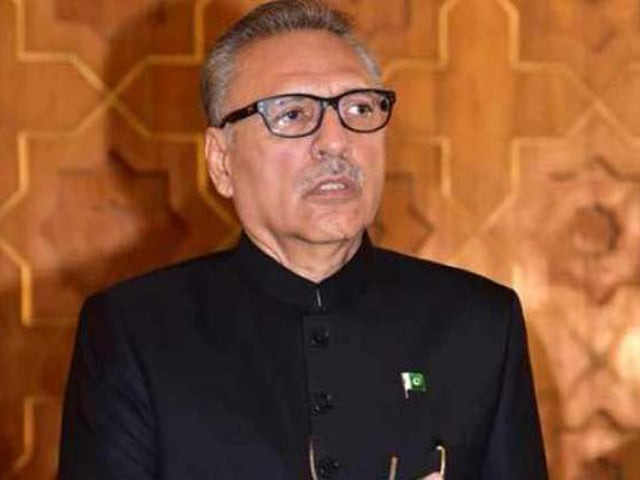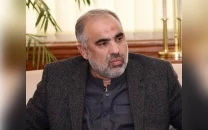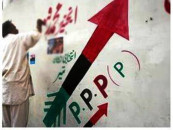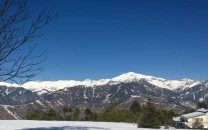Dr Alvi backs judicial probe into ‘Lettergate’
President writes to PM Shehbaz, CJ Bandial for setting up ‘empowered commission’ to conduct open hearings

President Dr Arif Alvi called on Tuesday for a thorough probe through an “empowered judicial commission” into the alleged regime-change conspiracy orchestrated to oust former prime minister Imran Khan.
The call came days after former prime minister Imran Khan sent letters to Alvi and Chief Justice of Pakistan Umar Ata Bandial, urging them to set up a commission to investigate the summary of a meeting between then Pakistan ambassador to the US and US Assistant Secretary of State Donald Lu.
In the letters, Imran, who was voted out through a no-confidence motion last month, declared that the summary contained proof that the vote of no-confidence was part of a “foreign-funded conspiracy”. Imran has repeatedly said that the US had “punished” his government for its independent foreign policy.
صدر مملکت ڈاکٹر عارف علوی کا سابق وزیراعظم عمران خان کے خط کا جواب
— The President of Pakistan (@PresOfPakistan) May 10, 2022
صدر مملکت نے خط میں حکومت میں تبدیلی لانے کے لیے مبینہ سازش کی مکمل تحقیقات کرنے پر زور دیا۔ pic.twitter.com/TdKCMB3wzv
Responding to Imran’s letter on Tuesday, the president said he was writing to Prime Minister Shehbaz Sharif and the chief justice, stressing that the circumstantial evidence in the matter should be recorded and investigated to “reach a logical conclusion and provide clarity to the people of Pakistan”.
| Read: Body to probe Imran’s ‘foreign conspiracy drama’ |
Underscoring the need for a full investigation into the matter, he informed Imran that he was sending his letter to the prime minister as well as to the chief justice with the request that “the latter may constitute an empowered judicial commission” to conduct open hearings.
According to a press release from the President’s Secretariat, Alvi said that he had read the copy of the cypher sent by Pakistan’s former ambassador to the US Asad Majeed Khan, containing an official summary of the meeting held in the Pakistan Embassy.
The cypher, the president said in the letter to the Pakistan Tehreek-e-Insaf (PTI) chairman, also “included Lu’s statements mentioning a no-confidence motion” against the then prime minister and the consequences of its success or failure.
The president also referred to the two meetings of the National Security Committee that had endorsed the view that “the statements of Mr Lu amounted to unacceptable and blatant interference in the internal affairs of Pakistan and the Government of Pakistan had rightly issued a demarche”.
He underscored that threats could both be covert and overt and in this particular case, it was clearly communicated in “undiplomatic language”. He noted that the former prime minister had raised serious issues of possible covert reactions and ramifications of the threat.
The president continued that he was of the belief that for a sovereign, proud and independent nation like Pakistan, and a people whose dignity had been deeply hurt, an in-depth analysis and investigation must be done to “inquire into what may or may not have been a preparation, starting before or following the overt threat, for a possible conspiracy to change the regime in our country”.
The president also highlighted that in the history of Pakistan, people had alleged and strongly believed in many obvious but, unfortunately, unproven conspiracies. In this regard, he cited the examples of the murder of the Shaheed Liaquat Ali Khan and the Agartala conspiracy case.
The president also said that late Zulfikar Ali Bhutto had waved a letter in public and alleged a conspiracy against him, while President Ziaul Haq’s plane crash, Ojheri disaster, Abbottabad conspiracy case and many others still remained inconclusive.
The president said that sometimes top-secret archives that were declassified after decades, or revelations by informed people, or documents that had emerged in leaks, did provide a smoking gun but added that it happened only after the destinies of those countries had been significantly damaged.
Alvi emphasised that proving a “smoking gun” had been identified “in the hand of a conspirator”, or finding a possible money trail or identifying meetings where people had been motivated towards covert action or where people had been bought and sold, would be a vigorous exercise.
He stated that even recorded circumstantial evidence could lead the way towards some conclusions and provide closure to the people of Pakistan who deserved clarity.


















COMMENTS
Comments are moderated and generally will be posted if they are on-topic and not abusive.
For more information, please see our Comments FAQ